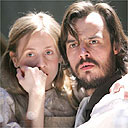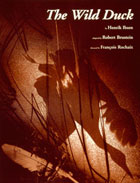|
Playwrights revisted:
Ibsen's wild duck is first laboratory animal (onstage)

Sinead Matthews (Hedvig)
Paul Hilton (Hjalmar Ekdal)
in the Donmar production
|
Critical reviews for productions of Henrik Ibsen's The Wild Duck focus on the dilemmas and conflicts of human relations.
When the play opened at the Donmar Warehouse in 2005, the Guardian's review spoke of the play's 'permanent relevance'. The Observer said the play was 'unquestionably a demolition of moral absolutes and fundamentalism'. The Independent said 'the play demonstrates the dangers of imposing your own skewed, self-interested idea of liberty on others'.
What passes unnoticed by critics of the Donmar's and more recent revivals is another, highly relevant aspect of the play: its commentary on the way humans regard animals.
The semi-domesticated animal has an important role beyond the mirroring the fate of the human characters, according to the philosopher H.A.E. Zwart. What is staged in The Wild Duck is the struggle between a scientific and a romantic perception of animal behaviour that continues to influence contemporary debates about animals in research. The Wild Duck was written in the 1880's when the scientific practice of observing animal behaviour under artifical conditions was emerging. Under those conditions, often in private rather than institutional settings, the animal's environment and behaviour were reduced to separate and modifiable elements.

poster from production by the
American Repertory Theatre
|
Onstage, what is happening to the wild duck is similar to what was happening to some animals. This unprecedented scientific practice was altering the ways in which animals are viewed. The contrasting romantic perspective values animals as being at one with their natural surroundings. As expressed in the play, the animal taken from its natural environment loses it dignity and its mystery as it becomes domesticated and docile. The disconnection of the animal from its natural surroundings is seen as a form of violence.
This conflict between romantic and scientific perceptions of the animal and animal-human relations as first expressed in The Wild Duck continues to be a backdrop to current debates on the well-being, integrity and death of animals used in research.
In current revivals of the play, this passes unnoticed. Wallace Heim
The photograph above of the Donmar Theatre production is by Tristram Kenyan.
The poster pictured above is from the 1996-97 production by the American Repertory Theatre.
published in 2005
|